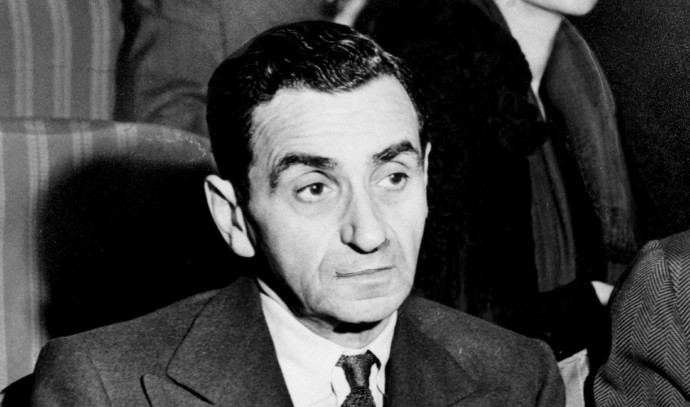In 1946, venerated American composer and lyricist Irving Berlin (born Israel Beilin) wrote the song “There’s No Business Like Show Business” for the musical Annie Get Your Gun.
The lyrics of the song epitomize the highs and lows that performers experience when they put themselves out there to entertain audiences. Here is an excerpt from the song:
There’s no business like show business like no business I know.
Everything about it is appealing,
everything that traffic will allow.
Nowhere could you get that happy feeling when you are stealing that extra bow.
There’s no people like show people,
they smile when they are low.
Even with a turkey that you know will fold, you may be stranded out in the cold; still you wouldn’t change it for a sack of gold, let’s go on with the show.
Yesterday they told you you would not go far; that night you open and there you are. Next day on your dressing room they’ve hung a star, let’s go on with the show!
The many Jewish comedians throughout entertainment history
Over the years, we as audiences have had the sheer delight of being entertained by some of the funniest, most creative talents in the realm of comedy. So as a point of national pride, let’s take a look at some of the Jewish comedians that have brought love and laughter into our lives.
Henny Youngman was the master of the rapid-fire one-liner. In fact, he was dubbed the “King of the One-Liners” by newspaper columnist Walter Winchell. One of Youngman’s classic lines was “Take my wife… please.” My personal favorite line of his is “Never marry a beautiful girl because she’ll leave you. An ugly girl could leave you too, but who cares?”
On the subject of beauty, Alan King (Irwin Alan Kniberg) had a joke that I will always remember: “My wife went on a diet of Limburger cheese and garlic. She didn’t lose any weight, but from far she looked great.”
Relationships are, of course, a rich source of material for comedians. For example, Rodney Dangerfield (Jacob Rodney Cohen) peppered his act with the phrase “I don’t get no respect.” One joke in particular stands out in my memory: “Well, with girls I don’t get no respect. I had a blind date. I waited on the corner. A girl walked by. I said, ‘Are you Louise?’ She said, ‘Are you Rodney?’ I said, ‘Yeah.’ She said, ‘I’m not Louise.’”
When it comes to non-stop, rapid-fire laugh-a-minute jokes, sight gags, and puns, The Marx Brothers had it all. Widely considered to be among the greatest and most influential comedians of the 20th century, the brothers are universally known by their stage names Chico, Harpo, Groucho, Gummo and Zeppo. The core of the act was the three elder brothers Chico (Leonard Joseph), Harpo (Arthur), and Groucho (Julius Henry), each of whom developed a highly distinctive stage persona.
Between 1905 and 1949, they made 14 feature films, five of which were selected by the American Film Institute as among the top 100 comedy films. The brothers’ filmography includes The Cocoanuts; Animal Crackers; Monkey Business; Horse Feathers; Duck Soup; A Night at the Opera; A Day at the Races; Room Service (featuring Lucille Ball and Ann Miller); At the Circus; A Night in Casablanca; and Love Happy (featuring a walk-on by Marilyn Monroe).
In all the films, Harpo played the silent partner, so to speak (– or not speak!). In contrast to the mainly verbal comedy of his brothers Groucho and Chico, Harpo’s comic style was visual, an example of vaudeville, clown and pantomime traditions. He wore a curly reddish-blond wig and blew a horn or whistled in order to communicate. In Groucho’s memoir, he wrote that Harpo simply wasn’t very good at memorizing dialogue, so it was ideal to portray the archetypal vaudeville role of the “dunce who couldn’t speak.”
And he played the harp. Beautifully.
Harpo learned how to hold a harp by emulating a harp-playing angel in a picture he saw in a five-and-dime store. He began learning to play the instrument without lessons. Despite his musical talent, he never learned to read or write music. Harpo died in 1964, and in his will, he requested that his harp be donated to the State of Israel. According to sources, the harp is located at the Jerusalem Academy of Music and Dance.
The early era of television was a veritable goldmine of superlative comedic fare. In the comfort of our own living rooms, we were treated to the wit and humor of legends such as Jack Benny (Benjamin Kubelsky); Milton Berle (Mendel Berlinger); Sid Caesar (Isaac Sidney Caesar); Carl Reiner; Jackie Mason (Yacov Moshe Maza); and George Burns (Nathan Birnbaum).
Born in New York on January 20, 1896, Burns died in Beverly Hills on March 9, 1996, at age 100. In his later years, he was often seen in the company of young women. When asked why he didn’t go out with women his own age, he said, “There aren’t any.”
Behind the scenes, the Jewish voice also made itself heard loud and clear. Mel Blanc (Melvin Jerome Blank), referred to as “The Man of a Thousand Voices,” is regarded as one of the most influential people in the voice-acting industry and one of the greatest voice actors of all time. His was the voice of Bugs Bunny; Daffy Duck; Porky Pig; Tweety; Sylvester; Yosemite Sam; Foghorn; Leghorn; The Tasmanian Devil; and numerous other characters from the Looney Tunes and Merrie Melodies theatrical cartoons. He later voiced characters for Hanna-Barbera’s television cartoons, such as Barney Rubble and Dino on The Flintstones. Astounding.
Jewish talent also had a strong hand in the print media. Mad Magazine was first published in 1952. It was founded by editor Harvey Kurtzman and publisher William Gaines, both Jewish. Way ahead of its time, one issue of the American humor magazine had a particular back page ad spoof that I will always remember. In the ad, a man is sitting by a lake, setting packs of Salem cigarettes afloat. The tagline reads: “Sail ‘em, don’t inhale ‘em.”
In regard to all-time great lines, we go back to the silver screen. Carl Reiner’s son Rob Reiner directed the 1989 rom-com When Harry Met Sally. Rob cast his mother, Estelle, as a customer in a scene with stars Billy Crystal and Meg Ryan at Katz’s Delicatessen, in which Ryan fakes what was described as “a very public (and very persuasive) orgasm.”
Approached by a waitress after Ryan finishes her impassioned simulation, Estelle Reiner deadpans “I’ll have what she’s having.” The line was ranked 33rd on the AFI’s list of the Top 100 Movie Quotations.
To conclude this little jaunt into the wonderful world of Jewish humor, I will leave you with a joke that starts with the familiar trope “A man walks into a bar….”
He sits down at the counter and orders a glass of Glenfiddich whiskey. A voice comments, “Good choice! You have very good taste. As he takes a sip, he hears another voice say, “That’s a nice tie you’re wearing.” Not seeing anyone else in the bar, he is flummoxed to hear another voice comment, “Your watch is very stylish.” The bartender, seeing the man’s confusion, smiles and remarks, “Oh, that’s the peanuts,” he says. “They’re complimentary.” ■



